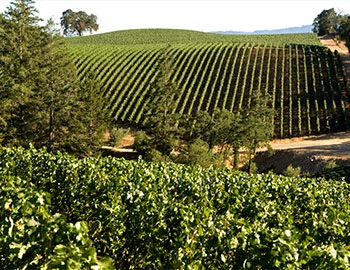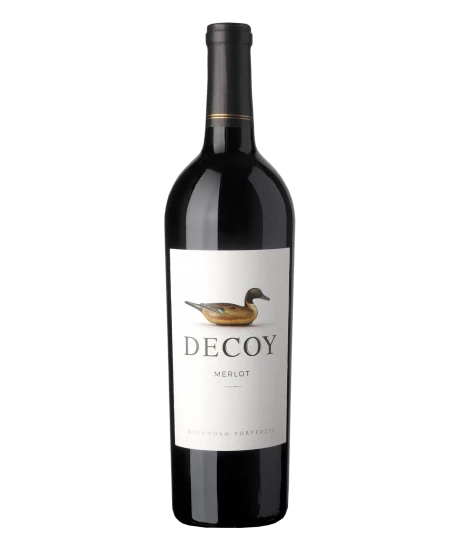Merlot California Decoy 2021
Merlot California Decoy 2021
California, Duckhorn Vineyards, 750 ml

Description
This red wine showcases the elegance of Merlot highlighting the typical fruit aromas of the variety. Alluring aromas of black cherry, raspberry and plum are in the foreground. On the palate it is supple, softly textured and enormously multi-layered with silky tannins, loads of juicy fruit, with some spicy notes and a long, fruity finish.
Attributes
| Grape variety: | Merlot, Cabernet Franc |
| Producer: | Duckhorn Vineyards |
| Origin: | USA / California |
| Ripening potential: | 2 to 5 years |
| Drinking temperature: | 16 to 18 °C |
| Food Pairing: | Roast veal with morel sauce, Mushroom ragout, Rabbit ragout with olives, Spicy hard cheese, Hot Asian dishes |
| Vinification: | soft pressing, fermentation in wooden barrel |
| Harvest: | hand-picking, strict selection |
| Maturation: | in partly new and used barriques/ Pièces |
| Bottling: | filtration |
| Maturation duration: | 12 months |
| Volume: | 14.0 % |
| Note: | Contains sulphites |
Duckhorn Vineyards
Co-founded by Dan and Margaret Duckhorn in 1976, Duckhorn Vineyards has spent nearly fifty years establishing itself as one of North America’s premier producers of Napa Valley wines.
From its modest first vintage of 800 cases of Cabernet Sauvignon and 800 cases of Merlot in 1978, to its addition of Sauvignon Blanc in 1982, Duckhorn Vineyards has cultivated a tradition of quality and excellence that continues today, making Duckhorn Vineyards one of the most renowned producers of Bordeaux varietal wines.
Fundamental to this tradition was the early decision to focus on the production of premium Merlot. Although many Napa Valley wineries used Merlot as a blending grape in the late 1970s, only a few spotted its potential as a wine in its own right. Dan Duckhorn, a huge fan of Merlot since his travels to Saint-Émilion and Pomerol, felt that this elegant grape variety was underestimated in North America. In the late 1980s, the Duckhorns began acquiring more vineyards in acclaimed areas of the Napa Valley. Today, the Duckhorn Napa Valley Estate Vineyard portfolio comprises of nine unique vineyards, including St. Helena, Yountville, Calistoga and Howell Mountain. Each of them is growing Merlot alongside other grape varieties such as Cabernet Sauvignon, Cabernet Franc, Petit Verdot, Sauvignon Blanc and also Chardonnay, whose different characteristics reflect the variations in soil, terrain, microclimate and exposition. In 2001, the traditionally styled Estate House was built in beautiful St. Helena with stunning views of the surrounding vineyards.
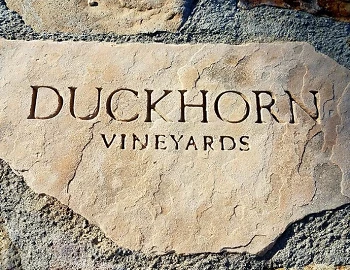
Merlot
Everybody’s darling
Merlot is the most charming member of the Bordeaux family. It shines with rich colour, fragrant fullness, velvety tannins and sweet, plummy fruit. It even makes itself easy for the vintner, as it matures without issue in cool years as well. This is in contrast to the stricter Cabernet Sauvignon, which it complements as a blending partner. Its good qualities have made the Merlot famous worldwide. At over 100,000 hectares, it is the most-planted grape in France. It also covers large areas in California, Italy, Australia and recently in Eastern Europe. The only catch is that pure Merlot varieties rarely turn out well. Its charm is often associated with a lack of substance. Only the best specimens improve with maturity. They then develop complex notes of leather and truffles. This succeeds in the top wines from the Bordeaux appellation of Pomerol and those from Ticino, among others.
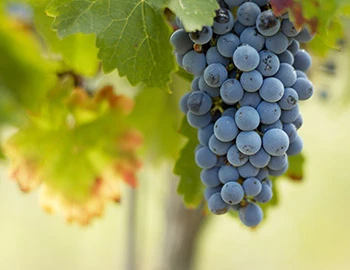
Cabernet Franc
Forefather of the Bordeaux varieties
The Cabernet Franc is one of the oldest varieties of Bordelais and a parent of three other red grapes in the Bordeaux assortment: Cabernet Sauvignon, Merlot and Carmenère. It is distinguished by its complex, flavourful bouquet of raspberry, graphite, violet, liquorice and white pepper. In addition, it presents round, crisp tannins which turn out less strongly than those of Cabernet Sauvignon. While the Cabernet Franc always appears as part of a blend in Bordeaux, it is pressed alone on the Loire. The most renowned appellations are Chinon and Bourgueil. Incidentally, the Cabernet originates not in Bordeaux but in the Spanish Basque Country. Cabernet owes its name to the Latin “carbon”, meaning black.
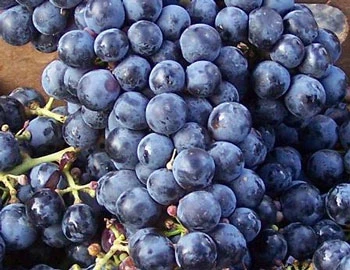
Cabernet Franc
Forefather of the Bordeaux varieties
The Cabernet Franc is one of the oldest varieties of Bordelais and a parent of three other red grapes in the Bordeaux assortment: Cabernet Sauvignon, Merlot and Carmenère. It is distinguished by its complex, flavourful bouquet of raspberry, graphite, violet, liquorice and white pepper. In addition, it presents round, crisp tannins which turn out less strongly than those of Cabernet Sauvignon. While the Cabernet Franc always appears as part of a blend in Bordeaux, it is pressed alone on the Loire. The most renowned appellations are Chinon and Bourgueil. Incidentally, the Cabernet originates not in Bordeaux but in the Spanish Basque Country. Cabernet owes its name to the Latin “carbon”, meaning black.

California
California: Lots of fruit and ripe tannins
Around 90 percent of the wine produced in the USA comes from California. The Napa Valley, situated roughly 100 kilometers north of San Francisco, is the most prominent wine region in the western hemisphere. California vintners first caused an international sensation with Chardonnay and Cabernet Sauvignon. Today, however, superior wines are also produced from Pinot Noir, Syrah and other varieties. California’s wine country shows more variety today than ever before.
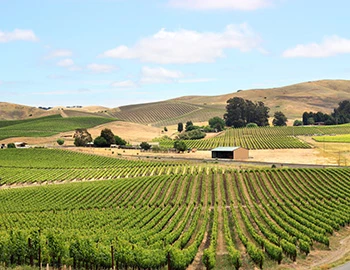
USA
USA - Yes, they can!
The United States is the third-largest nation on the planet in terms of both land area (after Russia and Canada) and population (after China and India). Every conceivable climate zone can be found in the US, from hot deserts to arctic frost. Thanks to immigration from all over the world, the US is probably the most multicultural country on the planet. Thus it has the ideal conditions for producing internationally recognized wine.
